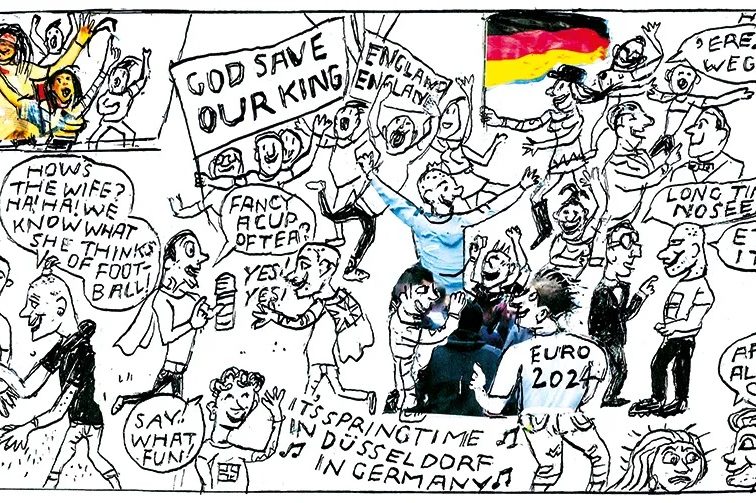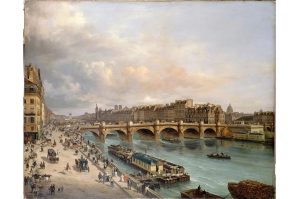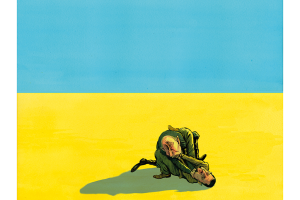Düsseldorf, Germany
In downtown Düsseldorf, a district known as “the longest bar in the world,” hordes of happy England fans belted out “God Save the King.” The Three Lions beat Serbia in nearby Gelsenkirchen and supporters were still celebrating in the days after. Last time Germany hosted the UEFA European Football Championship (aka the Euros) in 1988, hundreds of England fans rioted in Düsseldorf, but I’ve seen no sign of trouble. The English are outnumbered by French and Austrians. Everyone is getting on well. Times have changed. German bartenders used to be wary of England fans. Now, thankful for their first big windfall since Covid, they welcome them.
There was admittedly a little controversy over the weekend, whipped up by social media. England fans were filmed singing “Ten German Bombers” outside a bar in Düsseldorf’s Altstadt but my German friends didn’t seem too bothered. Then news broke that there was fighting on the streets of Gelsenkirchen but it turned out it was Albanians versus Serbians.
A peaceful piss-up is never going to be as newsworthy as a riot, but it seems to me that the media is missing a far bigger story, which is how well “fanzones” have worked, where ticketless fans can watch the drama. They are a familiar part of every tournament, but back in 2006 when I visited Cologne for the World Cup, they were completely new. Everyone thought the idea was crazy. Unsegregated fans watching the matches on giant screens in public spaces with limitless booze? It seemed like a recipe for disaster. Yet remarkably, these fanzones were a hit and transformed Germany’s international reputation. They turned the entire country into a massive street party, a carnival, a fiesta — in Germany, of all places!
This is Germany’s first major tournament since then and the atmosphere is much the same. Fans from every country are here in huge numbers and, as a midpoint between several host cities, Düsseldorf has become a lively hub. Not everything has run smoothly (England fans had to queue for hours to board trams after the game in Gelsenkirchen — so much for ruthless German efficiency), but in Düsseldorf everyone seems content, drinking away the idle hours between games.
I had a ticket for France versus Austria but I couldn’t get a ticket for the England game, so I watched the match on a giant screen beside the Rhine. I feared it might feel anodyne. I needn’t have worried. There were lots of England fans there and a few Serbians, and no trouble but lots of banter. In fact, in a way it felt more atmospheric than being inside the stadium for France versus Austria the following night. The police presence was discreet, security was efficient yet low-key, and the whole thing felt a lot less corporate. It reminded me of standing on the terraces as a teenager.
Going to see France versus Austria at Düsseldorf’s Rheinstadion, my tram was full of French and Austrian fans, engaged in spirited, good-natured rivalry. But there were also loads of neutrals — Germans in Fortuna Düsseldorf shirts, and Scotland fans in kilts and sporrans. Walking back into town after the game, surrounded by dozens of different nationalities, this felt like multiculturalism at its best.
For a workaday city like Düsseldorf, Euro 2024 is invaluable advertising. On match days, footage of the city is beamed all around the world. It’s a big money-spinner, too. Düsseldorf has spent $20 million, but they calculate that if 50,000 fans attend five matches and spend $100 each, they’ll make a $5 million profit. That estimate seems overcautious: the Tartan Army, here for several days between matches, must be spending more than that on beer alone.
“The Euros couldn’t come at a worse time for Germany,” argued Katja Hoyer in The Spectator recently. I couldn’t agree less. On the contrary, Euro 2024 is just what Germany needs right now, to give the battered Bundesrepublik a much-needed lift.
This article was originally published in The Spectator’s UK magazine. Subscribe to the World edition here.


















